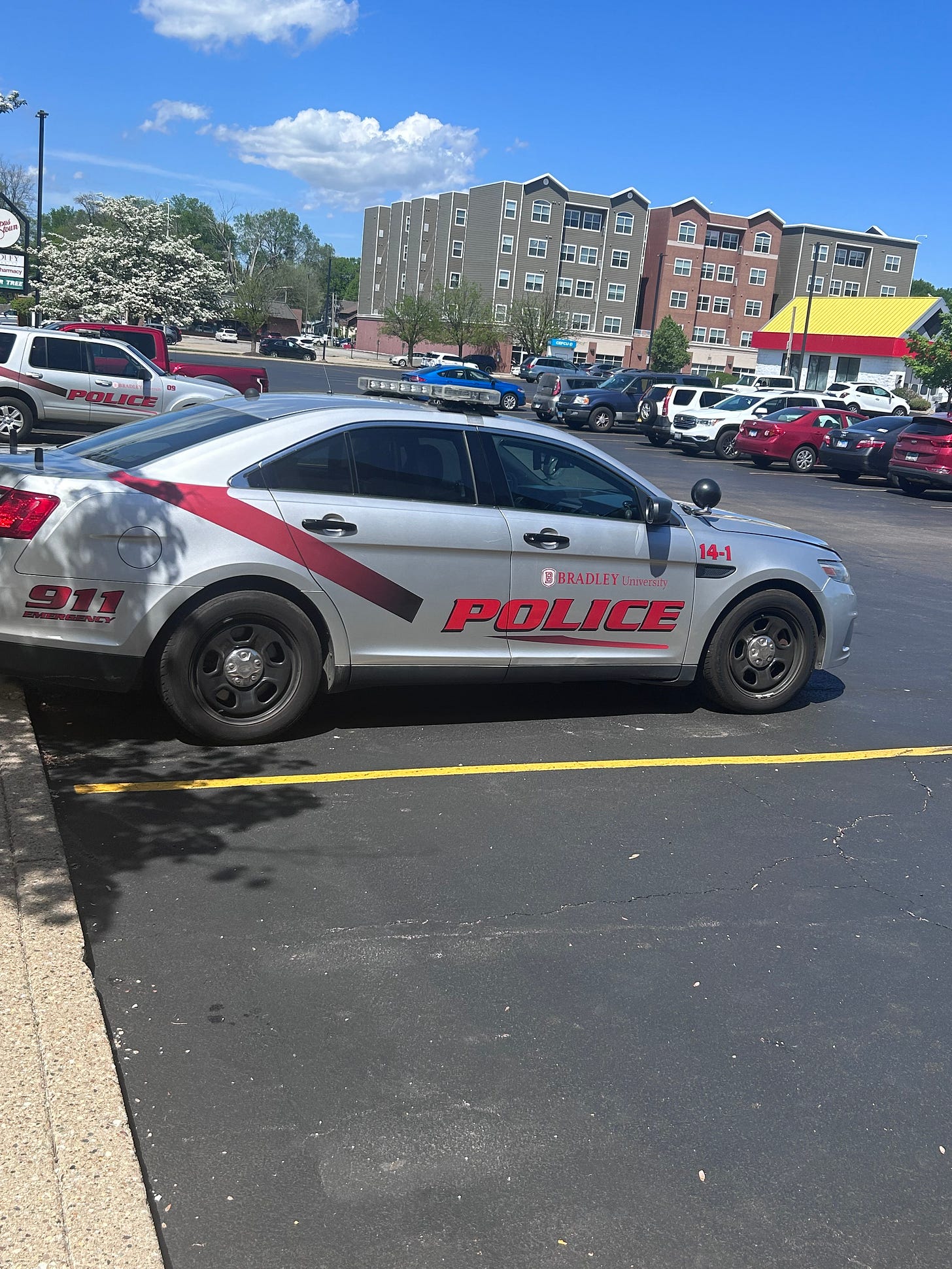Policing the hilltop
We often see the negative side of policing with situations like issuing tickets, or shutting down parties, but there is much more that goes into serving a campus community.
Being a police officer, in any capacity, is one of the most dangerous jobs one can have, but policing a college campus brings its own unique experiences. From stopping public urination to tracking down fugitives, the Bradley University police officers work to serve the university and its surrounding areas.
The duties of police officers at Bradley encompass a wide range of tasks while having to cover a relatively small area in comparison to other universities. These officers are your everyday people, but what goes into becoming a campus police officer?
How to become a university police officer
Applying to become a university police officer is similar to other jobs in the workplace. An interested applicant can simply search, “Bradley University police department applications”, and will be directed to the Bradley University career page.
To find job listings, applicants should click on “police officer” under the current opportunties tab. Upon clicking police officer, applicants will be directed to Bradley’s workforce ADP page. On this page lies a full breakdown of what is required to become a university police officer.
The university has a laundry list of requirements for its officers, including but not limited to being; a U.S. citizen, a resident of Illinois, and having a driver’s license.
Outside of the basic requirements, applicants must also have a criminal history free of any convictions, be able to carry a firearm, and pass a background investigation.
If an applicant makes it through that process, they can have a sit-down interview with a representative from the department, usually a sergeant or chief of police.
“We’re really looking for people that can engage and communicate,” Chief Brian Joschko said. “We can teach a lot of other aspects of policing, like how to do traffic stops or arresting bad people. All that type of stuff. What you can’t really teach is communication and the ability to engage with people.”
After the interview process, applicants must meet Illinois state standards and a power test. Applicants are tested on their physical agility on a sliding scale according to age to ensure they can do the job.
After being hired by an agency, aspiring officers are sent to a police academy for 16 weeks. While there, students take physical training, law, drug and arrest courses. In the later stages, officers work on hand-to-hand combat, traffic stops and patrol training.
Once students graduate from the training academy, the department requires an additional 16 weeks of field training, where new officers must shadow a more experienced officer. New officers are also placed on a one-year probation that they must complete to continue at the department.
The process of becoming an officer seems extensive to the average person, but according to veteran captain Troy Eaton, the process was much more difficult in the past.
“I went to the academy in 1990, almost 35 years ago,” Eeton said. “Back then it was only ten weeks, but it was a state police academy. You were confronted by a drill sergeant at the door. They piled stuff on to you and they never let up. We were only allowed to come home on weekends, but were not allowed to leave at night.”
“It was some pretty extensive physical training,” Eeton added. “They were trying to weed people that didn’t want to be there or couldn’t make up their mind.”
The Officer Experience
Officers have to go through a lot to get the job, but once accepted, the work only starts there.
Daily, officers work eight-hour shifts patrolling the campus and its surrounding areas. Officers spend their days looking for signs of danger, trespassing, and issuing traffic violations, but at any time can be called into action to help the Peoria Police Department.
Because the department is on the job 24/7, shifts are divided into three, and younger officers often get scheduled on the weekend into the weary hours of the night.
“It’s extremely difficult to manage your personal life when you’re working second and third shift and weekends,” Eeton said. “Police officers tend to hang out in smaller friend groups. They get distanced from their friends because they aren’t always able to go out on a Friday night or a Saturday night.”
Their work does not stop in the school year. Officers must sit through the dog days of the summer, often without much to do with students away from campus.
“During the summer it’s hard to stay focused because there’s a lot of inactivity,” Eeton said. “You’re driving around and you don’t see anybody. Remaining vigilant and keeping your eyes on campus is one of the most challenging things to do.”
Despite the danger officers put themselves in and the sacrifices they make in their personal lives, officers are paid just $23.50 per hour for their first year, with the opportunity of a three-dollar raise in year two.
Benefits of being an officer
Outside of the pay, there are added benefits of being a campus police officer for Bradley. For starters, the officers receive health insurance, mental health resources and significant tuition savings for officers and their families.
Officers also receive paid lunches, life insurance, and a retirement plan. An additional benefit, believe it or not, is being able to serve Bradley students.
“I enjoy helping and talking to people every day,” Officer Adam Broachures said. “I enjoy moving around the campus, the kids here are usually well-behaved.”
Police officers have extremely difficult jobs. Crimes such as stolen cars, and battery are on the rise. The best thing Bradley students can do to help officers is continue to be Brave and well-behaved.






